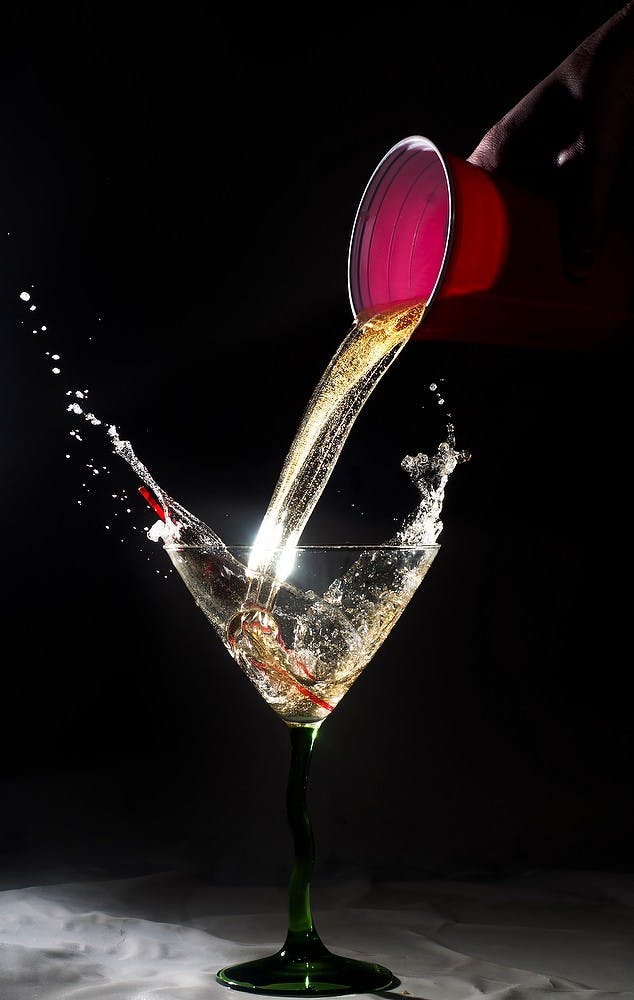“East Lansing: City of the Arts.”
A banner with these words hanging across an abandoned building on 100 W. Grand River Ave. signify the new identity the East Lansing City Council envisions for the city.

Photo illustration by Justin Wan/The State News
“East Lansing: City of the Arts.”
A banner with these words hanging across an abandoned building on 100 W. Grand River Ave. signify the new identity the East Lansing City Council envisions for the city.
East Lansing also goes by another nickname seen on its website, “East Lansing: the Home of Michigan State University.”
Despite both calling East Lansing home, city officials’ and students’ visions for the city don’t always align.
There have been mixed reactions among students and businesses to rules regulating college havens such as bars and hookah lounges in the area.
East Lansing City Council is faced with accommodating 43,000 full-time students at a school with a party reputation while dealing with about 48,579 permanent residents whose idea of a fun Friday night might not necessarily mean a trip to the bars.
“All the rules are trying to strike a balance,” said Mayor Pro Tem Nathan Triplett. “There are negative behaviors. … Rules are intended to address those concerns.”
The goal
In the past several months, East Lansing City Council has discussed several ordinances meant to help the city, but it might have created red tape for services catering to a college crowd.
The 50-50 ordinance, which restricts restaurants in East Lansing from having alcohol sales exceed 50 percent of total revenue in a 90-day period, was put in place in the late 1980s to control excessive drinking in the city. Although council members discussed eliminating the requirement for businesses to report alcohol sales, the requirement remained in place.
“I think it’s a worthwhile goal not to have a large number of bars that just sell alcohol,” Councilmember Kathy Boyle said.
When the Black Cat Bistro, a new restaurant coming to downtown East Lansing, was approved by the council, East Lansing Mayor Diane Goddeeris expressed concerns that “the money is in the alcohol versus the money in the fine dining.”
Although the bistro was approved by the council, the decision to approve the restaurant’s liquor license was postponed.
The recently proposed hookah lounge ban, which is set for a public hearing at council’s Feb. 5 meeting, would prohibit cigar bars and specialty tobacco shops, including hookah lounges, from establishing in East Lansing.
Triplett said the ban is intended to create a diversity of businesses and address public safety, such as reducing residents’ exposure to the health effects of smoking.
“If there are too many of any type of establishments, it makes downtown a less attractive place for people to come patronize,” he said.
Ryan McBride, manager of the Blue Midnight Hookah Lounge, 330 Albert Ave., said he doesn’t want to see the hookah ban implemented.
“It just seems like a barrier from people bringing a business to East Lansing,” he said.
The reality
Economics professor Charles Ballard said although the city put the 50-50 rule in place to control overconsumption, it might have had the opposite effect.
Support student media! Please consider donating to The State News and help fund the future of journalism.
To ensure revenue from alcohol is less than half of total revenue, restaurants might lower alcohol prices. Cheap booze could encourage more people to buy alcohol.
“It does seem like a pretty cumbersome way to reduce overconsumption,” he said. “It actually might lead to an increase or no change (in alcohol intake).”
This was the case for Dublin Square Irish Pub, 327 Abbot Road. General Manager Eric Allchin said he has had to lower alcohol prices and raise food prices to comply with the rules. Although he appreciates standards the rule sets for bars in the area, there’s no doubt it makes business difficult.
“It’s hard to be a 50-50 restaurant in a college-based town,” he said.
The effect
Kinesiology junior Kaylee Bleecker said a fine-dining restaurant is something she’d like to see downtown, but she’s not sure if that type of restaurant would be successful.
“College kids just like to go in and get their food and leave,” she said.
The 50-50 ordinances also might discourage businesses from moving to the city, said Community and Economic Development Administrator Lori Mullins.
“We’ve had interest from people who said they’ve wanted to open a place where they could have shows, performances and they would just like to serve beer and wine,” Mullins said in a previous interview. “That wouldn’t be allowed because that wouldn’t fall under our definition of a restaurant.”
Finance senior William Goldberg said he doesn’t think the 50-50 rule should be in effect and doesn’t think it’s fair for businesses to report their sales.
“As far as bringing new businesses, there’s a lot of undeveloped area in East Lansing, and that could be a limiting factor of new developers, new businesses trying to come in,” he said. “It’s this law that bans their ability to profit how they would want to.”
View Restaurants and the 50/50
rule in a larger map